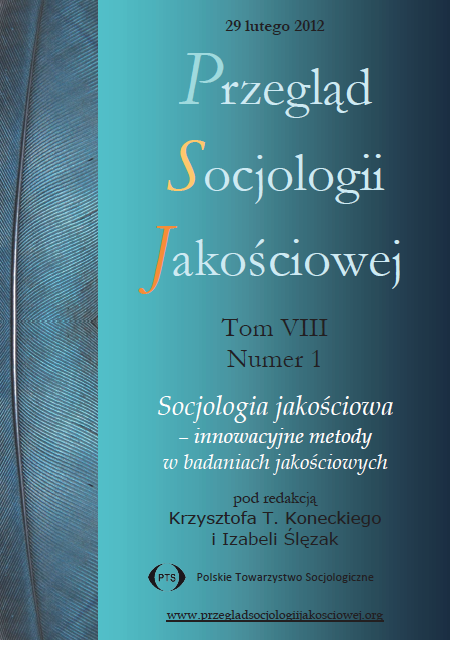Social audit as a proposal to enrich instruments of social research methods
DOI:
https://doi.org/10.18778/1733-8069.8.1.04Keywords:
social audit, research on working conditions, garment industry, methodologyAbstract
Paper presents the social audit method – a research tool designed to measure discrimination in the employment area. Social audit is used to examine the discrimination problem in the recruitment process and to study working conditions, especially these of female staff, in companies applying or having obtained the CSR (Corporate Social Responsibility) certificates. The audit methodology combines the experimental approach with the fieldwork orientation: hidden and open observation, various types of interviews, documentation analysis linking to financial audits and occupational health and safety control. This approach seems to be similar to the grounded theory methodology or to the evaluation research methods. The paper examines the audits conducted in Poland – both these commissioned by a non-governmental organizations in order to evaluate the working conditions, and these conducted by the author of this paper to countercheck its methodology and adapt it to the local environment, pointing out its advantages and disadvantages.
Downloads
References
Angrosino Michael V. (2009) Obserwacja w nowym kontekście. Etnografia, pedagogika i rozwój problematyki społecznej. Przełożył Filip Rogalski [w:] Norman K. Denzin, Yvonna S. Lincoln, red., Metody badań jakościowych. Warszawa: Wydawnictwo Naukowe PWN.
Google Scholar
Bezrobocie wśród absolwentów (2008) „Monitor Rynku Pracy”, 9 lipca 2008 [dostęp 2 lutego 2012]. Dostępny w Internecie http://www.rynekpracy.pl/monitor_rynku_pracy_1.php/wpis.10
Google Scholar
Callamard Agnès (2001) Metodologia badań nacechowanych wrażliwością na społeczno-kulturową tożsamość płci. Przełożyła Sylwia Pikiel. Gdańsk: Amnesty International
Google Scholar
w Polsce.
Google Scholar
Centrum Praw Kobiet (2000) Wpływ procesu prywatyzacji na położenie kobiet – kobiety w polskiej w gospodarce okresu transformacji. Raport z badań [dostęp 2 lutego 2012]. Dostępny w Internecie http://www.cpk.org.pl/images/stories/documents/attach_113.pdf
Google Scholar
Desperak Izabela, Śmiałek Judyta (2010) Młodzi w Łodzi – prekariat z wyższym wykształceniem. Raport z badań 2010 [raport z badań Think Tanku Feministycznego w ramach projektu „Odzyskać obywatelstwo. Gender i ekonomia opieki”] [dostęp 2 lutego 2012]. Dostępny w Internecie http://www.ekologiasztuka.pl/pdf/f0099prekariat-lodz.pdf
Google Scholar
Ehrenreich Barbara (2006) Pracować za grosze i (nie) przeżyć. Przełożyła Barbara Gadomska. Warszawa: Wydawnictwo WAB.
Google Scholar
Fix Michael, Struyk Raymond J., eds., (1993) Clear and Convincing Evidence: Measurement of Discrimination in America. Washington: Urban Institute Press.
Google Scholar
Griffin John Howard (1962) Czarny jak ja. Przełożył Józef Giebułtowicz. Warszawa: Iskry.
Google Scholar
Karpieszuk Wojciech (2010) Miasto porozmawia z klubami o zakazie selekcji. „Gazeta Wyborcza”, 15 marca 2010 [dostęp 2 lutego 2012]. Dostępny w Internecie http://warszawa.gazeta.pl/warszawa/1,34889,9252991,Miasto_porozmawia_z_klubami_o_zakazie_selekcji.html
Google Scholar
Konecki Krzysztof T. (1992) W japońskiej fabryce. Społeczne i kulturowe aspekty pracy i organizacji przedsiębiorstwa. Łódź: Instytut Socjologii Uniwersytetu Łódzkiego.
Google Scholar
Konecki Krzysztof T. (2000) Studia z metodologii badań jakościowych. Teoria ugruntowana. Warszawa: Wydawnictwo Naukowe PWN.
Google Scholar
Koss-Goryszewska Maryla (2010) Testy dyskryminacyjne. Charakterystyka techniki i zastosowanie w wybranych krajach. Warszawa: ISP.
Google Scholar
Martela Borys (2006) Nie ma pracy, bo ma zły adres. „Metro”, 25 sierpnia 2006 [dostęp 2 lutego 2012]. Dostępny w Internecie http://serwisy.gazeta.pl/wyborcza/1,68586,3571615.html
Google Scholar
Pager Devah (2003) The Mark of a Criminal Record. „American Journal of Sociology”, vol. 108, no. 5, s. 937–975.
Google Scholar
DOI: https://doi.org/10.1086/374403
Podolska Joanna, Kołakowska Anna (2006) Zamknięta za zdjęcia. „Gazeta Wyborcza”, 19 lipca [dostęp 2 lutego 2012]. Dostępny w Internecie http://forum.gazeta.pl/forum/w,443,45260839,45517886,tekst_Artykulu.html
Google Scholar
Spreckley Freer (2008) Social Audit – A Management Tool for Cooperative Working. Beechwood College [dostęp 2 lutego 2012]. Dostępny w Internecie http://www.uk.locallivelihoods.com/Moduls/WebSite/Page/Default.aspx?Pag_Id=109
Google Scholar
Szabuńko Joanna, Seibert Anita, Kamińska Anna (2005) Warunki pracy kobiet w polskim przemyśle odzieżowym. Warszawa: Koalicja KARAT [dostęp 2 lutego 2012]. Dostępny w Internecie http://cleanclothes.pl/wp-content/uploads/2009/11/CCC_2005_PL1.pdf
Google Scholar
Turner Jim, Doane Deborah, eds., (2007) CSR Frame of Reference [dostęp 2 lutego 2012]. Dostępny w Internecie http://mvoplatform.nl/wat-is-mvo/mvo-referentiekader-engels
Google Scholar
Wick Ingeborg (2003) Workers’ tool or PR ploy? A guide to codes of international labour practice. Bonn–Siegbiurg: Friedrich-Ebert-Stüftung, Südwind Institut für Ökonomie und Ökumene.
Google Scholar
Downloads
Published
How to Cite
Issue
Section
License

This work is licensed under a Creative Commons Attribution-NonCommercial-NoDerivatives 4.0 International License.














